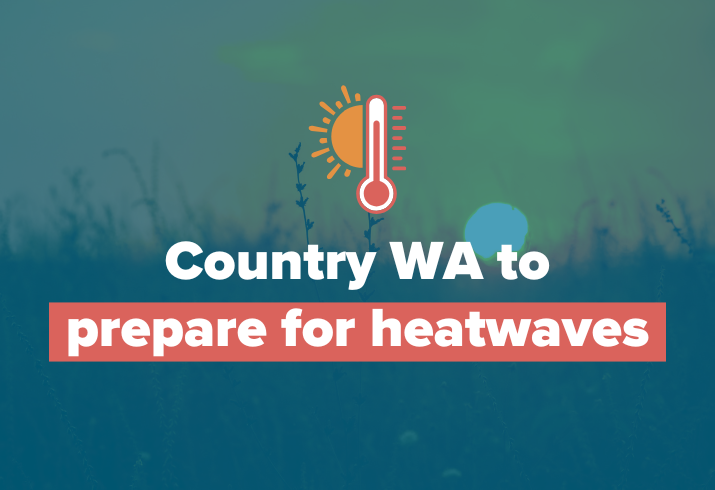Country WA to prepare for heatwaves

WA Country Health Service is encouraging country communities to be prepared and keep safe ahead of heatwave season.
Country WA can experience long periods of extreme heat. Heatwaves occur when the minimum and maximum temperatures are much hotter than usual.
Heatwaves can happen anywhere, so it’s important to take steps to protect yourself, your loved ones, and your community from the health impacts of extreme heat.
Emergency Physician and Command Centre Medical Director Dr Justin Yeung said during extremely hot weather people are more at risk of experiencing heat-related illnesses such as dehydration, heat stress and heat stroke.
“Heatwaves can have serious health impacts for everyone in our communities, but especially for at-risk groups like the elderly, young children, and those with chronic illnesses,” he said.
“It’s important to know the signs of dehydration and heat stress to avoid becoming unwell - and in serious cases - a trip to hospital.”
Dr Yeung said that while it can get hot in the bush year-round, heatwaves are serious weather events.
“Heatwaves are an important reminder not to be complacent when temperatures reach extreme levels.
“In places like the north and inland areas where maximum temperatures can reach the mid to high forties, it’s even more reason to follow the health advice to make sure you keep yourself, loved ones and community safe and well,” he added.
“During a heatwave, it’s important to avoid dehydration and overexposure to the sun. Be sure to stay hydrated, take regular breaks if you’re outside and wear appropriate clothing.”
Health safety advice:
- Seek a place to keep cool, such as your home, a library, community centre or shopping centre.
- Close your windows and draw blinds, curtains, or awnings early in the day to keep the heat out of your home.
- If available, use fans or air-conditioners to keep cool.
- Keep hydrated by drinking plenty of fluids. Fluids include water, diluted juice (mixed with water) and low sugar sports drinks.
- Limit or avoid alcohol and caffeinated drinks (including tea, coffee, and energy drinks) as these can increase dehydration.
- Limit time outdoors. If you need to go outside, try to do so in the early morning or late evening. If you do go outside make sure to put on a hat and sunglasses, apply sunscreen and try to stay in the shade.
- When outdoors, wear lightweight, light-coloured, and loose-fitting clothing that covers as much skin as possible.
- Sleep with just a sheet over you in the coolest part of the house. Remove winter bedding and replace it with lightweight, cotton bedding.
- Wrap medications needing refrigeration in foil or heat repellent containers with an icepack to keep them cool if there is a power outage.
- Take regular breaks if you’re working or being active outside.
- Let someone know if you’re traveling a long distance.
If you start feeling unwell, seek medical attention. This can be through clinics (such as Aboriginal Medical Services and National Aboriginal Community Controlled Health Organisations), seeing your GP or visiting hospitals and health services.
If you have an acute or chronic medical condition, it’s important that you take the necessary steps to stay safe and if you find yourself in an emergency call 000.
Remember to stay informed and up to date with current heatwave alerts on Emergency WA and weather forecasts from the Bureau of Meteorology.
For more information visit: HealthyWA - Heatwaves and Working Safely in Hot Conditions.

